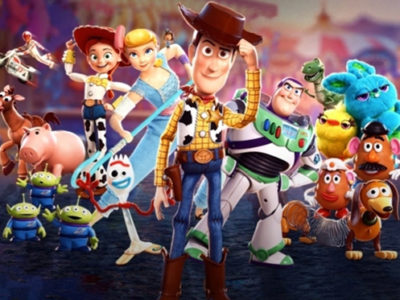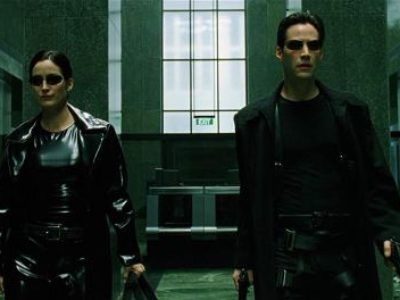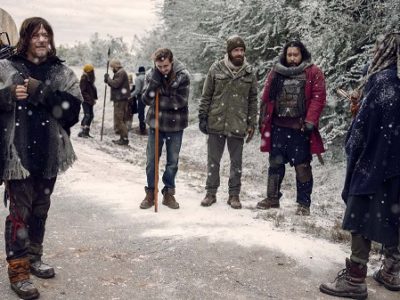Review| The Nice Guys
S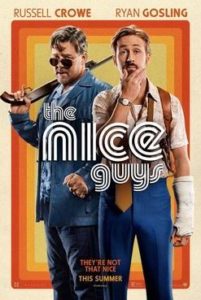 hane Black is no stranger to action flicks. As a writer he turned the strange pairing of Mel Gibson and Danny Glover into a lovable action duo in the Lethal Weapon series. As a director he has excelled with Robert Downey Jr. on a couple of occasions (Iron Man 3, Kiss Kiss Bang Bang). Now he takes his helm at the director’s chair once again with The Nice Guys, an R-rated crime comedy starring Russell Crowe as brutish hit-man Jackson Healy, and Ryan Gossling as semi-sleazy private investigator Holland March.
hane Black is no stranger to action flicks. As a writer he turned the strange pairing of Mel Gibson and Danny Glover into a lovable action duo in the Lethal Weapon series. As a director he has excelled with Robert Downey Jr. on a couple of occasions (Iron Man 3, Kiss Kiss Bang Bang). Now he takes his helm at the director’s chair once again with The Nice Guys, an R-rated crime comedy starring Russell Crowe as brutish hit-man Jackson Healy, and Ryan Gossling as semi-sleazy private investigator Holland March.
Set in 1970s era Los Angeles and focused largely on the porn industry, The Nice Guys carries a ring of a poor man’s Big Short minus the 4th wall breaks, or as fellow RWT staffer Joshua Crabb put it, “a slapstick Boogie Nights”. The former description is probably more apt as there is definitely no shortage of crudeness on the level of any random Boogie Nights scene, and there is underlying family drama bringing emotional weight to otherwise lighter comedy. When this film is shining it’s usually because Ryan Gossling is on screen. His comedic talents are evident in other films, but he really stood out in this film in that regard. That’s not to say that Russell Crowe is dragging everyone down. Not at all. It’s just you get exactly what you expect with Crowe whereas Gossling takes you by surprise with the spot on delivery of his humor. The film itself does a nice job balancing between deductive crime investigation and humorous family drama. Crowe provides most of the levity as the burly hit-man, but much of the script is dedicated to the relationship between Gossling’s character and his daughter, Holly (Angourie Rice). Holly’s mother died recently in such a way that Holland feels as though he could have prevented it. We see Holly often reminiscing on times past while also grasping at the difficult task of bringing balance and a sense of responsibility to her now alcoholic father.
 My note of it being a poor man’s Big Short is for a couple of reasons. One is the general inquisitive nature of our main characters. In Big Short, Steve Carell stumbles upon the sub-prime mortgage crisis and begins a quest to investigate the truth of the matter and get to the bottom of it. Not unlike the way in which a private investigator might go about looking for a missing person or piecing together clues to solve a crime. The second reason is the nature of the crimes which both films are examining. While Big Short wears it on its leaves, The Nice Guys uncovers their crime/conspiracy gradually and the audience learns of it as the characters do. What appears at the onset to be a murder mystery has at its roots a cover-up involving the very justice system tasked with punishing the guilty in this case. So in a similar manner, this is a bit of an attempted commentary on institutional conspiracy at a criminal level.
My note of it being a poor man’s Big Short is for a couple of reasons. One is the general inquisitive nature of our main characters. In Big Short, Steve Carell stumbles upon the sub-prime mortgage crisis and begins a quest to investigate the truth of the matter and get to the bottom of it. Not unlike the way in which a private investigator might go about looking for a missing person or piecing together clues to solve a crime. The second reason is the nature of the crimes which both films are examining. While Big Short wears it on its leaves, The Nice Guys uncovers their crime/conspiracy gradually and the audience learns of it as the characters do. What appears at the onset to be a murder mystery has at its roots a cover-up involving the very justice system tasked with punishing the guilty in this case. So in a similar manner, this is a bit of an attempted commentary on institutional conspiracy at a criminal level.
Without spoiling it, I can tell you that the nature of that crime/conspiracy is very “of the times” in that the smog-heavy atmosphere of Los Angeles continues to pop up as a narrative and eventually becomes an indicator as to what we’re dealing with. You’ll want to pay attention whenever the air-quality is mentioned, with particular consideration as to whose air-quality is in reference. It’s for that reason that I believe the last scene, while not the most climactic or memorable, is actually the most important of the film.
Healy and March sit at a bar to share drinks and reminisce on the successes and failings of their recent escapades when a lone bee lands next to March. It is smashed immediately under a newspaper, and in that act we learn more about the nature of this story than any revelatory clue in the main plot could ever tell us. Throughout the film we have this recurring note of how the smog is killing; killing people, killing birds, killing bees. We don’t want to die as a result of our pollution of the air. We don’t want the birds to die. We don’t even want the bees to die. Yet, when confronted by a single bee, one of our heroes instinctually smashes it. This innocent, lonely bee is one of the very creatures in need of saving from this polluted air. But without hesitation it is squashed.
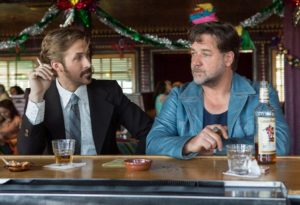 Many will mistake this film for an environmental message, but I think it’s more than that. I think simple environmentalism is used as a device to tell a story about man’s inherent nature to ruin the things he loves and wants to protect. The bee is one of the creatures under the saving graces of man, and so it is representative of man’s saving power. And what happens when man is in charge of the salvation? It’s destroyed. Man can rightly identify the things worth protecting and saving, but when it comes to ensuring that salvation we are a mess.
Many will mistake this film for an environmental message, but I think it’s more than that. I think simple environmentalism is used as a device to tell a story about man’s inherent nature to ruin the things he loves and wants to protect. The bee is one of the creatures under the saving graces of man, and so it is representative of man’s saving power. And what happens when man is in charge of the salvation? It’s destroyed. Man can rightly identify the things worth protecting and saving, but when it comes to ensuring that salvation we are a mess.
This isn’t so different from the picture that scripture paints of mankind. We are depraved creatures, always wanting to do things our own way and often reckless in our decision making. Isaiah says that, “All of us like sheep have gone astray, each of us has turned to his own way…” (Isa. 53:6). Paul repeats the same mantra when he says that “All have sinned and fall short of the glory of God.” (Rom. 3:23). If our goal in this life is only the temporary comfort or redemption of the created world and the creatures within, then we set ourselves up for failure. If, however, we have the glory of God as our motivation, then caring for His creation will naturally extend from that. We are made with eternity in our hearts (Eccl. 3:11) so that we may seek He who is eternal. We know we screw up, yet we are often blinded to the fact that our very desire to control every detail of our lives is the cause of our grief.
Content Warning:
The Nice Guys is rated R for graphic violence, nudity, and sexual content. It does center on the 1970’s porn industry, so you can imagine where that leads the story. There are a few occasions where the nudity is not an aid or a necessity in the scene, so they do embellish it a bit. Children should not see it and those bothered by violence or nudity should take caution.



